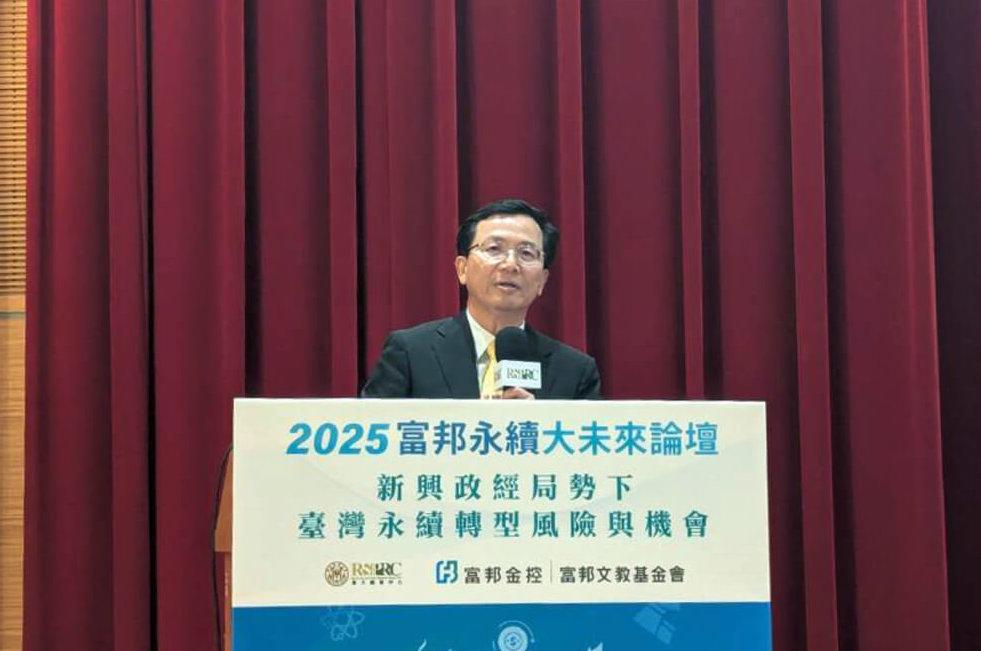Taiwan’s carbon fee, announced last year, has not driven companies to set carbon reduction targets or internal carbon pricing, showing that “green” finance policies are not being implemented down the corporate ladder, National Taiwan University’s Risk Society and Policy Research Center found in a survey released today.
The center’s Corporate Sustainability Disclosure Preparedness Survey was conducted from March to April, targeting companies with annual revenue exceeding NT$100 million (US$3.34 million).
A random sample of 906 companies was drawn, focusing on key industries including traditional high-carbon manufacturing, electronic high-carbon manufacturing, construction and transportation, the center said.

Photo: CNA
Since Taiwan implemented a carbon fee in October last year, its lenient pricing compared to international standards has failed to drive companies to set carbon reduction targets or internal carbon pricing, center director Chou Kuei-tian (周桂田) said.
Key climate policies and regulations, such as carbon pricing, green finance and the major electricity usage clause, lack clear targets, Chou said.
In terms of sustainable finance, there has been little growth in climate-related engagement between banks and businesses, he said.
The survey focuses on three major areas: climate disclosure, sustainable finance, and labor and human rights, the center said.
Twenty percent of surveyed companies have disclosed climate policies and the proportion of listed companies with climate-related disclosures has been increasing annually, it said.
However, due to lax domestic carbon pricing policies, “many companies have stalled in setting net-zero targets or reporting greenhouse gas emissions, and some have regressed when it comes to supply chain carbon accounting and emissions reduction planning,” the survey found.
Only 2.3 percent of respondents have implemented internal carbon pricing and the proportion of companies assessing medium to long-term climate risks has dropped by about 10 percent compared to last year, it said.
In terms of sustainable finance, only 10 percent of companies have engaged in climate-related dialogue with financial institutions, and about 60 percent of companies either are unaware of or see no need for climate-related financial products, the survey found.
In terms of labor and human rights, nearly 70 percent of companies reported hiring middle-aged or elderly employees, the center said.
In terms of gender equality, about 60 percent of companies stated there was no significant gender pay gap, while the number of male supervisors was clearly higher than that of female supervisors, it added.

Taiwan has received more than US$70 million in royalties as of the end of last year from developing the F-16V jet as countries worldwide purchase or upgrade to this popular model, government and military officials said on Saturday. Taiwan funded the development of the F-16V jet and ended up the sole investor as other countries withdrew from the program. Now the F-16V is increasingly popular and countries must pay Taiwan a percentage in royalties when they purchase new F-16V aircraft or upgrade older F-16 models. The next five years are expected to be the peak for these royalties, with Taiwan potentially earning

STAY IN YOUR LANE: As the US and Israel attack Iran, the ministry has warned China not to overstep by including Taiwanese citizens in its evacuation orders The Ministry of Foreign Affairs (MOFA) yesterday rebuked a statement by China’s embassy in Israel that it would evacuate Taiwanese holders of Chinese travel documents from Israel amid the latter’s escalating conflict with Iran. Tensions have risen across the Middle East in the wake of US and Israeli airstrikes on Iran beginning Saturday. China subsequently issued an evacuation notice for its citizens. In a news release, the Chinese embassy in Israel said holders of “Taiwan compatriot permits (台胞證)” issued to Taiwanese nationals by Chinese authorities for travel to China — could register for evacuation to Egypt. In Taipei, the ministry yesterday said Taiwan

‘LIKE-MINDED PARTNER’: Tako van Popta said it would be inappropriate to delay signing the deal with Taiwan because of China, adding he would promote the issue Canadian senators have stressed Taiwan’s importance for international trade and expressed enthusiasm for ensuring the Taiwan-Canada trade cooperation framework agreement is implemented this year. Representative to Canada Harry Tseng (曾厚仁) in an interview with the Central News Agency (CNA) said he was increasingly uneasy about Ottawa’s delays in signing the agreement, especially as Ottawa has warmed toward Beijing. There are “no negotiations left. Not only [is it] initialed, we have three versions of the text ready: English, French and Mandarin,” Tseng said. “That tells you how close we are to the final signature.” Tseng said that he hoped Canadian Prime Minister Mark Carney

POSITIVE DEVELOPMENT: Japan and the US are expected to hold in-depth discussions on Taiwan-related issues during the meeting next month, Japanese sources said The holding of a Japan-US leaders’ meeting ahead of US President Donald Trump’s visit to China is positive news for Taiwan, former Japan-Taiwan Exchange Association representative Hiroyasu Izumi said yesterday. After the Liberal Democratic Party’s landslide victory in Japan’s House of Representatives election, Japanese Prime Minister Sanae Takaichi is scheduled to visit the US next month, where she is to meet with Trump ahead of the US president’s planned visit to China from March 31 to April 2 for a meeting with Chinese President Xi Jinping (習近平). Japan and the US are expected to hold in-depth discussions on Taiwan-related issues during the